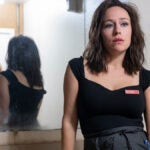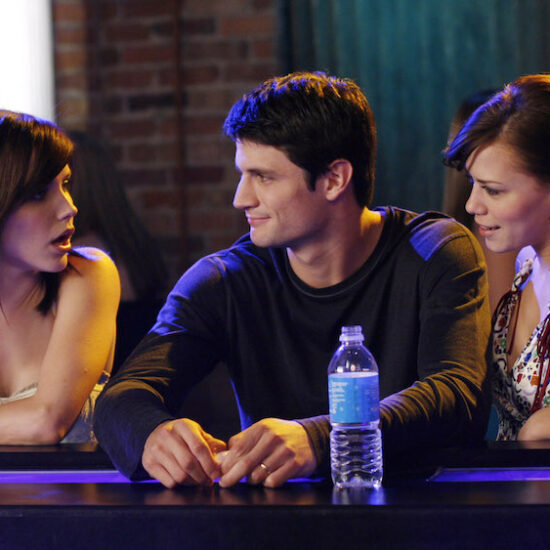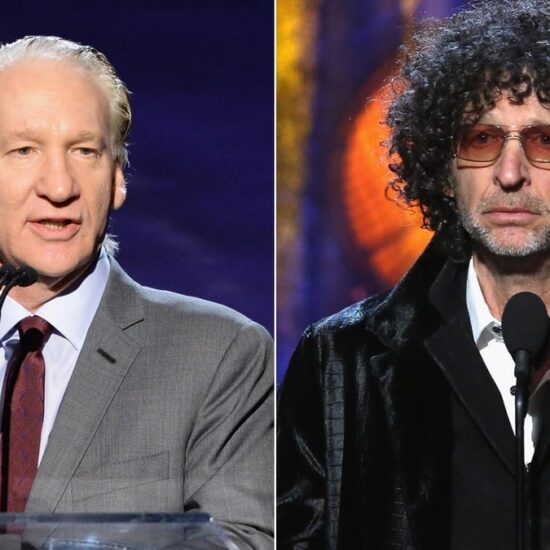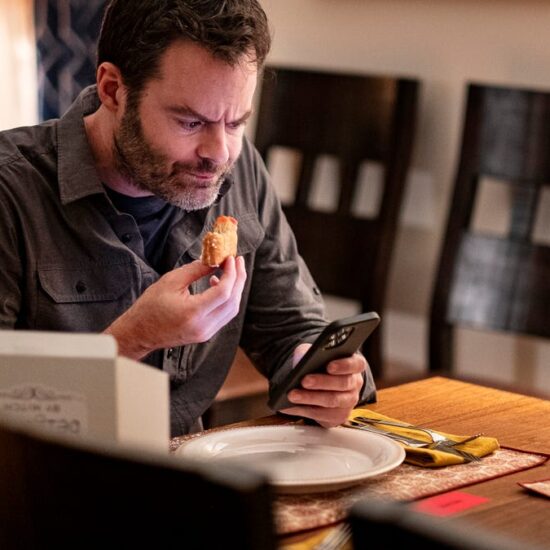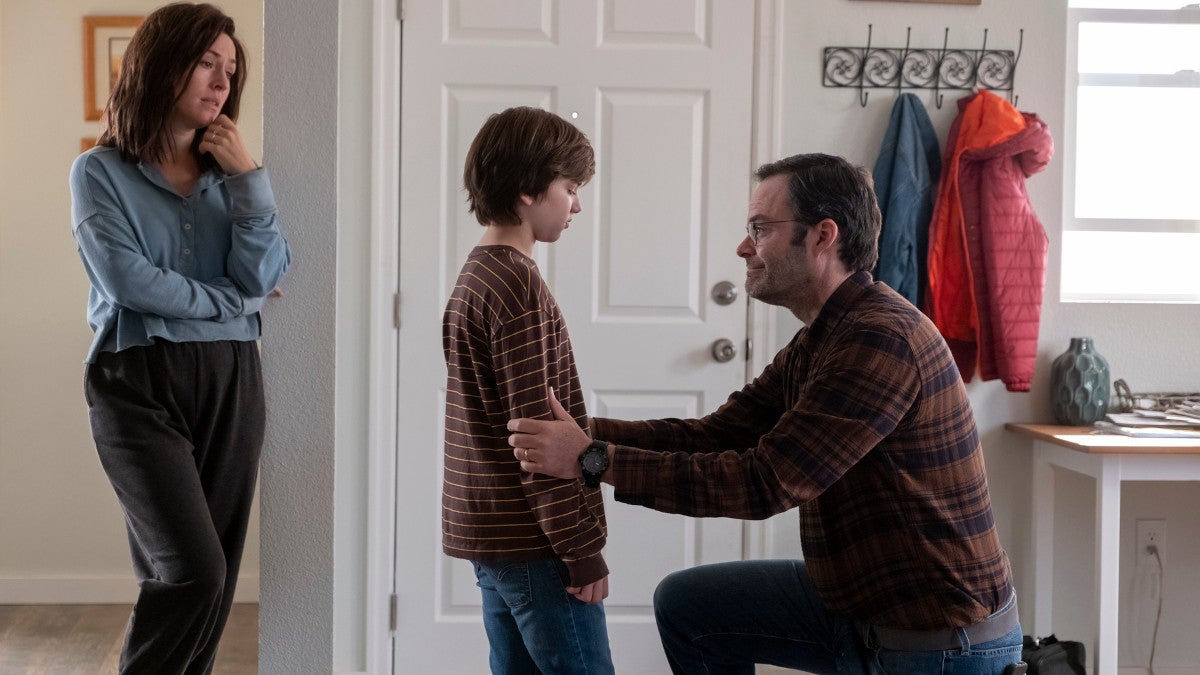
Bill Hader is certainly happy that people like “Barry,” but he also wants to be clear: the episodes you see are the product of a lot of refinement. Specifically in Season 4 Episode 6, there was an entire Sally storyline that would have (maybe) involved Jennifer Lawrence that was jettisoned and a scene that was reshot mere weeks before the series premiered.
“When you’re doing this stuff, people can tell you you’re great until they’re blue in the face, but you make a lot of mistakes,” Hader told TheWrap in our episodic breakdown interview for Episode 6. “People watch the show and go, ‘Oh my God it’s so good,’ and it’s like, ‘No, I make a lot of mistakes!’ You need smart people who aren’t afraid to tell you you’ve made a mistake to be like, ‘What are you doing?’”
Initially, Sally (Sarah Goldberg) was going to have a daydream that she flew to LA, made up with Natalie (D’Arcy Carden) and ran into Jennifer Lawrence who was supposed to play Sally in the Barry Berkman movie. In that run-in, Lawrence would have told Sally that she should play herself in the movie, and then Sally would wake up.
“My problem with that was it was similar to Cousineau’s journey. So while we were in the prep for Episodes 1 and 2, Liz Sarnoff and Duffy Boudreau and I had a meeting of what is Sally’s story in Episode 6?” Hader said. “We kept going back and forth and then, kind of like Episode 5, I was like, ‘Let me just try something’ and I wrote that sequence with her and the guy and the truck and everything. I was like, ‘What if it’s like this? Like a manifestation of her guilt,’ and they were like, ‘Great!’ and we ended up doing that.”
Read on for our full breakdown interview with Hader about “Barry” Season 4 Episode 6, which was conducted before the WGA strike.
Note: This will be our final episodic interview with Hader until the strike is over, as Hader is standing in solidarity with the WGA and not doing any more press. We will return with interviews with Hader for Episode 7 and Episode 8, the series finale, once the strike is over.
So Episode 6 begins with this idea that Barry is going to kill Gene, and it’s a righteous thing to do, but in reality he just doesn’t want Gene to be the one telling his story.
Yeah, it goes back to his anger at Lon O’Neill in Episode 3 and how he doesn’t like Gene telling his story, because Gene Cousineau’s version of things makes Barry look really bad. Barry doesn’t want that out there, and now that he has this kid who sees him as the perfect version of himself, he just wants John to think of him as this hero and this great guy. If that comes out, that’s bad. I like that he says, “Because I want the truth, and what Gene says is not the truth,” and Sally says, “Yeah but our son thinks my name is Emily” and he says “Yeah but he knows the real you,” which is just brutal (laughs). And Amy Gravitt’s favorite line of the entire season, the hardest she laughs, is when Barry says, “It’s either we do this or we take John to an orphanage and then we kill ourselves.” That’s such an extreme way to look at the situation (laughs). And Sally is right, she says this is just about you and Gene. It’s not gonna really stop anything, but in his mind if Gene’s dead it can mess up the movie in some way.
I love that she then changes tracks and says, “I don’t think this is God’s plan for you.”
Yeah she’s using what he cares about against him.
Tell me about the pastor podcasts that he’s listening to and this idea that he’s just hopping from one pastor to another until he gets the answer he wants.
Yeah that’s his journey of “Is it a sin?” You know, “Now I’m this guy but my old self used to sin,” so again it’s less about religion to me and more about you can find anything on the internet, whatever your view is. It’s just him actually searching things that are correct, murder is a sin, and he’s gotta go down the wormhole to find this ex-hockey player who’s somehow a pastor (laughs). That’s Bill Burr by the way, he’s Pastor Nick. The first pastor is our composer Dave Wingo and then the second pastor is James Austin Johnson from “Saturday Night Live” and they all did amazing jobs. That kind of came late in the episode actually. Barry doesn’t have a lot to do. In the episode initially, he just kind of drives up, shows up, and then he’s just kind of following Cousineau around. We thought it’d be nice if she says that and that sticks with him and he’s like, “Wait, is that a sin?” He’s not that bright, but he can find something that validates his feelings. It’s the same thing as looking up the baseball stuff.
There’s a reference in there when he’s leaving that they’ve moved around a lot, that they haven’t been in this place for long.
Yeah they move a lot, I don’t think that’s where they’ve been the whole eight years. I think it’s been a wide variety of places probably. And Sally doesn’t wanna get caught, she doesn’t wanna go to jail.
Now we can talk about Fuches as a badass. When did you come up with this idea of his evolution in prison and his big re-introduction in this episode?
Yeah The Raven becomes a reality. In Season 3, we introduced the idea of that scene where Hank goes, “They call him the Raven,” and everybody goes, “It’s such a terrible name.” I just said it’d be really interesting if in Season 4, somehow you go to the Raven, like he actually becomes a badass. And then when we came up with this idea of a time jump, it’s like, “Oh, now this makes a lot of sense that he would be in jail and get beaten to a pulp and everything and then come out with all his respects as The Raven. That is a sequence that is purely from the song. In Season 3 I had the radio on and that “The Wizard” song came on by Black Sabbath and I just immediately, just driving to set, it all popped into my head as you see it. Then I went and I acted it out for Duffy (Boudreau) and Gavin (Kleintop) and they were like “Oh that’s great.” And we were shooting stuff with Stephen on that farm with all the goats and I acted it out for him and he was like, “Sure, OK. OK Bill!” (laughs).
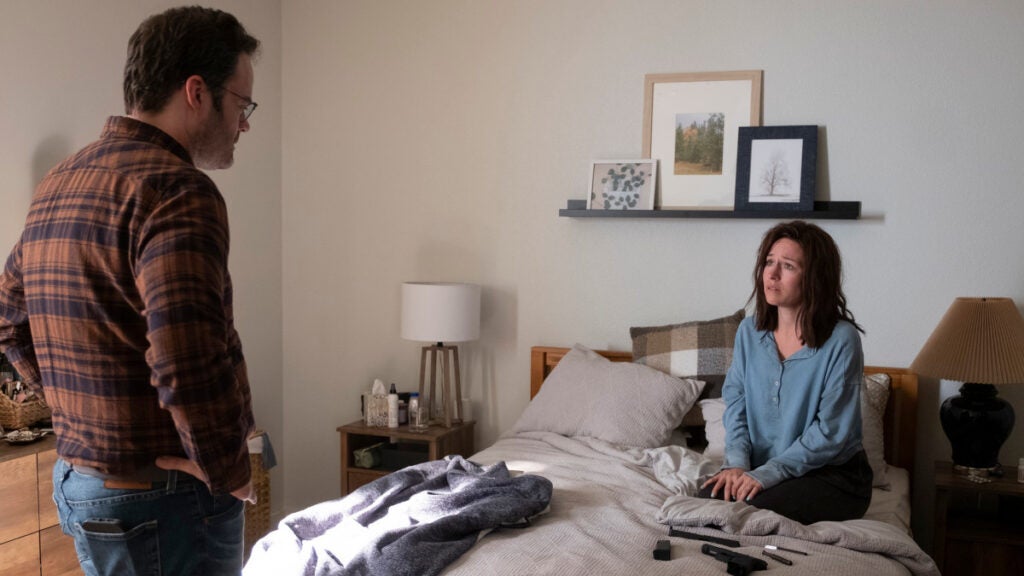
When I asked him about it he said he loved it. He was super into the whole transformation.
He was so funny and so game. He came up with the idea of the black fingernails. So that’s why I had him kind of showcase that and that little moment with him and the guard, we kind of came up with that on set. It was really fun.
And he immediately gets a family.
That was the other idea. Most times you have those scenes where guys come out of prison and they go and have sex with somebody and I was like, “I think what he wants is a family, so what if he got out and immediately gets a family?” Interestingly, the woman who plays his daughter is a great young lady by the name of Autumn and she was a PA on our show. She was so sweet and funny and I was talking to Duffy and was like, “What if that’s the woman’s daughter?” So Autumn was cast before we cast the woman who plays her mom. Aida Rodgers came up to her and was like, “Hey, would you be interested in being in this?” She was like, “Yeah, are you kidding?” Aida asked, “Do you act?” and she was like, “No, but I’m in film school and everything,” and she did a great job. She’s really good. She did her part and then we shot her stuff, and then when I came back, she had her walkie on and was walking up and I was like, “Wow, back to PA,” and she’s like, “Yeah man!” She went right back to work.
What came first, the idea of Hank as this tech guru crime boss or the idea that he would have to kill Cristboal to get there?
To me Nohobal and the statue of Cristobal is like Barry looking up Abraham Lincoln and all these things, it’s just a way for him not to feel bad. It’s this giant corporation to his denial. “I won’t have to feel bad if I build up Cristobal’s legacy. He died, but if I do this and have a big statue of him, I won’t feel bad,” and live in denial that way. By the end, you see how deep that denial is. The question is, can he be a crime boss?
I also like the idea that Fuches is his foot soldier and now all he wants is Barry dead.
He’s had eight to stew about Barry because Barry sold him out, and now he’s just a different guy. It’s a question of does he still love him or not? It seems like he doesn’t. His whole thing is Barry alone in a room with my guys.
Meanwhile, back home, Sally is giving John alcohol. She is miserable, locked in this place. And I think you realize she didn’t want Barry to go partly because she didn’t want him to kill Gene, but partly because she didn’t want to be alone with their son.
Yeah, and she knows her son hates her. There’s a lot of self-hatred because the kid hates her and she has to take care of him, and he’s crying and she’s drunk. So now, maybe if she gives him a little vodka he’ll pass out and she won’t have to deal with it. The big thing for us in the edit was making sure you can hear John snoring because people were like, “Wait, is he dead?” and you’re like, “No, no, I can hear him snoring,” (laughs). I think she doesn’t want to be left alone.
Initially, the Sally storyline was way different in this episode. It was her going online and seeing what people were saying about the movie. Then that stuff with D’Arcy Carden’s character Natalie was kind of a setup to see her start to watch the final episode of “Just Desserts,” but then she goes and it’s like the “Just Desserts” finale is #3 on some list and the Barry Berkman movie is #2, so it gives her this feeling of like, “Oh maybe this is my comeback” kind of thing. You see her read it and you see all these people online and on social media saying who they think should play Sally, and then she looks at John and then you cut and they get on a plane and fly to LA. They go into Warner Bros. and they see that it’s her and they’re so excited. They say, “You’re not gonna believe this, Jennifer Lawrence wants to play you.” Then she goes to this party and sees Natalie who’s so nice to her, like, “You taught me everything” and apologizes to her. Then she meets Jennifer Lawrence and Jennifer is like, “You know what? You should play Sally, not me,” then you cut and realize Sally is still at her keyboard and this has all been her daydream.
My problem with that was it was similar to Cousineau’s journey. So while we were in the prep for Episodes 1 and 2, Liz Sarnoff and Duffy Boudreau and I had a meeting of what is Sally’s story in Episode 6? Because I start pulling the thread of, “Isn’t this in the same ballpark of what Cousineau is doing?” Is that really her thing, or is it about being safe? We kept going back and forth and then, kind of like Episode 5, I was like, “Let me just try something” and I wrote that sequence with her and the guy and the truck and everything. I was like, “What if it’s like this? Like a manifestation of her guilt,” and they were like, “Great!” and we ended up doing that. The only thing that changed was when we got there, that guy initially you never saw him. You just heard his voice and you saw his foot come through a window. There was a scene where she’s looking in the mirror in her bathroom, and then behind her she notices a foot, like a man trying to get in through the window, and you see just his foot. She screamed and starts hitting the foot, and then the leg and the guy screams and falls out the window. I was just looking at it and thinking and I said, “What if it’s just this guy all in black?” The costume designer brought in some ideas and I was like, “No not a robber, it’s almost like he just blends in.” The first thought I had was you remember the poster for the Todd Haynes movie “Safe?” It was like that, but all in black. So that was what we were trying to do, but I had the idea of the costume basically that day so costumes was running around trying to make it work. How all that came about was being less about her being like, “Maybe I can make it” and more about her guilt.
A thing that came way late, I’m talking like early April, was what Sally heard initially through the door was a voice but it was a combination of me, Henry Winkler, Anthony Molinari who played the guy she killed, the actor who played Sam her husband and the actor who played her dad. So it was gonna be all of us saying the same thing, but it was gonna be modulated into one voice. Then I got this idea of what if it’s like I do one sentence and then Henry does the other sentence and then Anthony does one sentence, and we’re talking to the sound guys and I can just see the look on their faces. There’s a different look you get from people. Sometimes it’s, “That’s cool. F–k, that’s gonna be hard,” then there’s like, “That’s gonna be hard, and I don’t know if that idea is gonna work,” and that’s how Matt Taylor was looking at me (laughs). Then Duffy called me that night and he goes, “I think it should just be Anthony Molinari. It should just be his voice. Shane is who she feels the guilt about killing, that’s the guy who’s peeking over the seat in Episode 1.” Then, while we were in the edit, I got the idea of, “What if we just put the audio of when she stabbed him in Season 3?” It worked really well. So then we brought Anthony back and recorded everything after that, and then you hear him say, “Hey kid wake up your mom put something in my eye.” That was done and recorded a week before we premiered.
And then when the truck hits the house, that was something that I said, “’I’d love a truck to hit the house and I’d love the room to tilt,” and Aida Rodgers got really excited and said, “You mean a gimbal?” She was like, “Oh my God I would love to shoot on a gimbal!” That scene was the very first day of shooting the last block of “Barry,” Sarah in that room and us tilting the room on its side. I wanna say she had a lot of fun. We did it relatively fast. When she looks out the crack in the wall and you see that truck backing up, that was actually done months and months beforehand when we were shooting all this stuff out in Lancaster. We just put a wall up and put a giant tear in the middle and then shoot the truck backing up. Of course, we get out there, pick a truck, transportation brings the truck out there and the truck dies and we’re losing the light (laughs). For a wrap gift for the whole series, Aida Rodgers gave me a series of photographs and one of the photographs is a really beautiful black and white photo that Merrick, our amazing still photographer — who was the still photographer on “The Big Lebowski” incidentally — he has this amazing photo of me, Aida, Eric Schoonover, Gavin Kleintop and Wade Allen all next to that truck just laughing. The actual moment where we were like, “Are you f—king kidding me?” That kind of sums up film production right there, us next to this truck that’s smoking and we’re laughing. So the truck we used is actually Kenny our transportation coordinator’s truck that we had to convince him to let Wade get it dirty. He was like, “You can use my truck but you’ve got to clean it!”
Let’s talk about Gene’s headspace in this episode, because he seems to be acting pretty selflessly in not wanting this movie to be made.
So initially, Episode 5 was going to be half of Barry and Sally half of Cousineau on a kibbutz in Israel. He was gonna be Bar Mitzvah’d so it was this thing of him in Israel becoming a man and it was him doing his lessons and stuff with this 13-year-old boy. The episode initially ended with him, right before he’s officially a man, Tom calls him and is like, “They’re coming out with a movie about you guys,” and he flees (laughs). But I was like, he actually has to be selfless. This hurts the whole story. It’s more interesting if he’s actually changed. So then I wrote the version that we filmed, which was he’s being pitched a movie in an office and he’s listening, and then you see him with Josie the executive. And she’s saying we’re really excited, this is great, and he’s like, “I’m very excited” and then he goes from being excited about the movie to then like rope a doping her and being like, “Actually, I’m not into the movie. I just wanted to hear what you guys were planning, and now I know about it, I’m gonna take you down.” So story-wise, it was a surprise where you think Barry’s worst fear is Cousineau showing everyone what a monster Barry is and he’s gonna do the movie, and then at the end of the scene you’re like, “Oh my God, he’s actually not into it.”
So we do that and we shoot it and I show it to people, and Emma Barrie one of our writers goes, “That scene makes no sense. Why would Cousineau come back just to say he’s gonna do it but he doesn’t want to do it?” I’m like, “Well, it’s a big turn, see?” She said, “Right, but you’re looking at this more from a story point of view, from a character point of view, he wouldn’t do that, he would just come back. If he actually changed his life and became a selfless person, he would just come back and say, ‘I’m not doing this movie.’” And I was like, “But there’s no turn in that, and the article!” Initially the article we see at the end of Episode 5 said, “Gene Cousineau to Work on Barry Berkman Project,” it seemed like Gene was the one who had the idea of doing the movie. Like the studio wasn’t gonna do a movie, but because Gene came back, now they’re doing it. We had a long back-and-forth over text while I’m doing reshoots of the SWAT guys beating people up in Dave and Buster’s (laughs). Finally we talked on the phone and I go, “I don’t get why you don’t get this,” and she was like, “OK, just explain Cousineau’s plan to me,” and I started to do it and it sounded so dumb (laughs). We were done with reshoots so I go in with Ali Greer and Frankie Guttman and we tried to go in and re-edit that scene and use ADR to take that big turn out. Aida came in and I was explaining it all to her and she goes, “Why don’t we just reshoot the scene?” and I was like, “Can we do that?” and she goes, “I’ll call HBO right now.”
That’s why, when you’re doing this stuff, people can tell you you’re great until they’re blue in the face, but you make a lot of mistakes. People watch the show and go, “Oh my God it’s so good,” and it’s like, “No, I make a lot of mistakes!” You need smart people who aren’t afraid to tell you you’ve made a mistake to be like, “What are you doing?” That’s why Emma Barrie is somebody I will always show my stuff to forever, because she’s really smart and she isn’t afraid to be like, “I don’t get that.” So we went back and the very, very last thing forever that we shot of “Barry” was that scene with Tom and Gene and the studio where we just simplified it. I wrote it real fast with Duffy and gave it to Henry and we just did it really quickly. Then the very, very last shot ever of “Barry” was that DEA agent coming and going, “Gene Cousineau, take two more bites of that salad and come with me.” That was a series wrap for the whole thing.
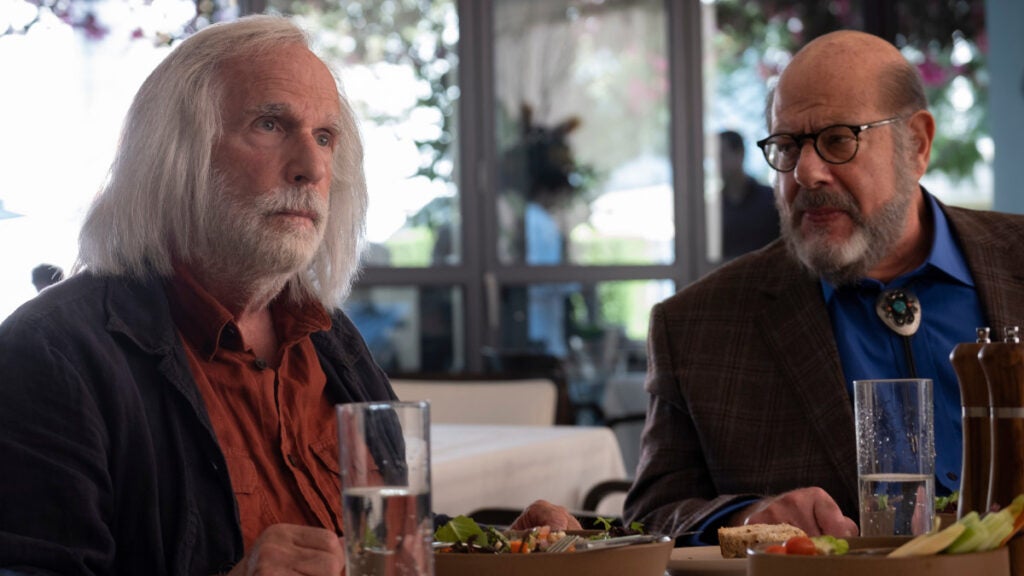
The very first shot of “Barry” was the establishing shot of Goran’s house in the pilot and then the second shot of “Barry” was Anthony coming out going “Hey, I’m Hank, you must be Barry.” Those are the first two things we shot and the last thing we ever shot was that guy going, “Two more bites of that salad and come with me” (laughs). The actor improvised that, by the way, which was very funny. He improvised, “Two more bites of that salad.” But yeah, it’s wild man. It’s funny when that happens.
But yeah, Emma deserves all the credit for making that storyline simpler. Because sometimes people can tell you what’s wrong, but she’s really good at saying, “This doesn’t make sense to me” but she doesn’t say here’s how to fix it, which is really helpful.
Where did the idea of Jim Moss capturing Barry come from?
That was always kind of a thing from the beginning, so in Episode 3 when he goes, “Hey, would you like to go to my garage?” and Lon goes to the garage and he comes out speaking German and you’re just like, “What does Jim Moss do to people?” that was always a setup to us knowing that at some point, Barry is going to end up in the garage. That garage is not a place you want to go. Because that was very early on when we came up with the idea of we should put Barry in the Cousineau hot seat.
Of all the ideas to have or places to go, that was definitely one that we all wanted to see was, at some point, Jim Moss captures Barry. The hardest scene to write and edit in that entire episode was Barry out in the car and Cousineau and his son inside, and just trying to pace that. It became this thing of “How long is Barry in there? Why isn’t he coming in?” You wanted to have this sense of he can come in at any moment. We had to cut down what Cousineau and his son were saying to each other. Here’s a fun thing when you’re editing a scene like this, is sometimes you’re cutting stuff and you don’t understand why it doesn’t work, and you’re cutting it and cutting it and you realize a line in the middle is really funny. So the first line that Cousineau now says to him is, “I’m sorry I shot you, I thought you were someone else” and “Your injuries weren’t life-threatening Baruch Hashem,” that was actually in the middle of the scene. Making that the first line made us laugh really hard. It’s such a thing to say having not seen him in eight years.
I also wanted to say that Ali Greer did an amazing job cutting the dinner scene with Fuches. We worked on that for a day and a half, there was so much stuff, and we really found the right sweet spot for that scene. It was a tough scene t cut because it was only four or five shots. There was a whole run of things that Hank was known for.
“Barry” airs on HBO on Sundays at 10 p.m. ET.







